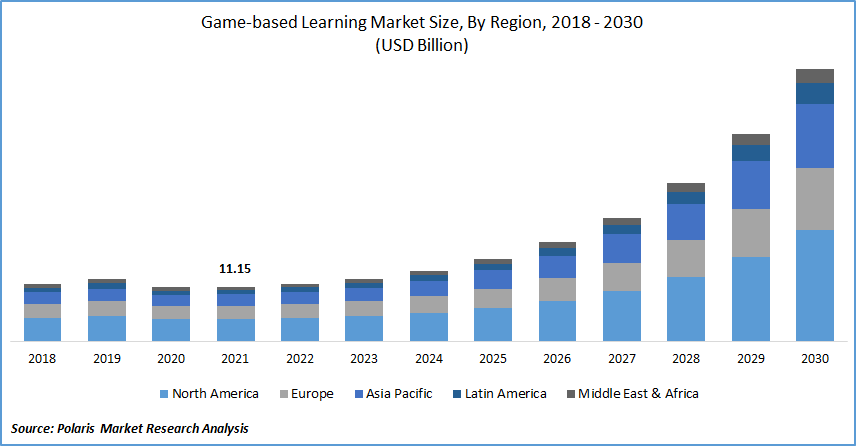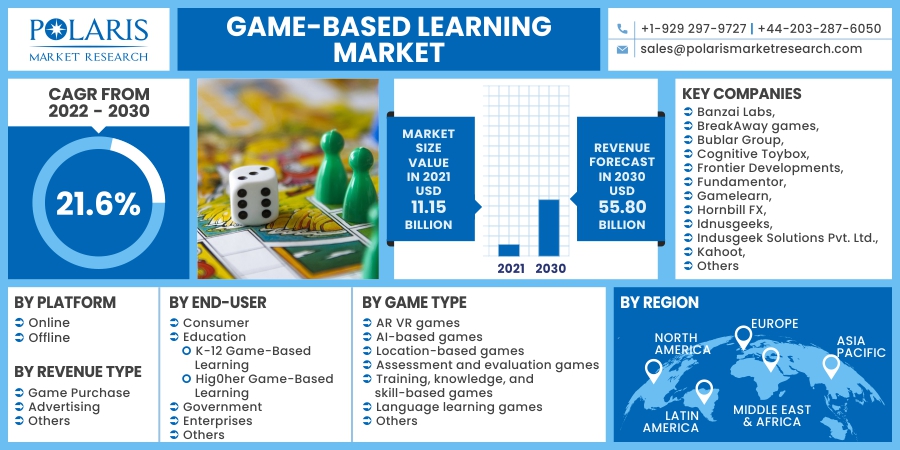
Game-Based Learning Market Share, Size, Trends, Industry Analysis Report, By Platform (Online, Offline); By Revenue Type; By End-User (Consumer, Education, Government, Enterprises, Others); By Game Type; By Region; Segment Forecast, 2022 - 2030
- Published Date:May-2022
- Pages: 114
- Format: PDF
- Report ID: PM2386
- Base Year: 2021
- Historical Data: 2018 - 2020
Report Outlook
The global game-based learning market was valued at USD 11.15 billion in 2021 and is expected to grow at a CAGR of 21.6% during the forecast period. The rising adoption of game-based learning for motivating students to learn through playing games and solving topics quickly boosts game-based learning market growth during the forecast period.
 Know more about this report: Request for sample pages
Know more about this report: Request for sample pages
Several educational institutions have increased their game-based learning techniques in response to the growing demand for high-quality education with an advanced and interactive approach. Furthermore, the adoption of tablet and e-learning methodologies in schools worldwide has boosted the global game-based learning market.
Further, the industry is projected to expand in the coming years as the global population of internet and smartphone users grows. According to the International Telecommunications Union 2020 data, approximately 72% of urban households had access to the Internet at home in 2019, almost double as many as the rural population (nearly 38%). The urban-rural divide was small in developed countries, but urban Internet connectivity was 2.3 times greater than rural access in developing countries.
Rising internet penetration is considered a substantial impact on the game-based learning market in the coming years. The growing number of smartphone users is expected to play an essential role in the overall game-based learning market growth in the coming years.
In addition, urbanization is expected to play a significant role in the coming years. according to the World Bank, approximately 68 % population is projected to live in urban areas by 2050, up from an estimated 55 percent in 2019. Better income and employment outlook, modernization, and the adoption of novel and advanced technologies benefit urbanization. Thus, the rising internet penetration, increasing smartphone users' adoption of e-learning, and growing urbanization drive game-based learning market growth during the forecast period.
However, the requirement for high security and information security from game-based learning restricts industry growth during the forecast period. There has been a significant increase in data breaches and cyberattacks in recent years. The lack of well-controlled, massive efficacy studies has slowed the general acceptance of game-based knowledge as a new knowledge framework.
Industry Dynamics
Growth Drivers
Rising demand for training, presentation, and meetings among corporates and education institutes will propel market growth. For instance, in February 2022, Imarticus knowledge acquired StratOnboard. StratOnboard, Imarticus Learning's 2nd purchase, is a strategic fit for its overall ecosystem and coincides with its various business segments, including Enterprise, Academic, Retail, and Purchaser.
In November 2021, Kahoot! announced the development of Kahoot! + Study, a new service for students in higher education. Kahoot! + Study enables students to design formative study experiences and expedite their knowledge in preparation for final exam time and throughout the school year.
Also, in January 2021, Spin Master purchased Rubik's Cube Cube to carry on Rubik's brand legacy, with strategies for further innovation across Rubik's portfolio and broad distribution across the company's worldwide presence. Interactive challenges, automatically generated feedback, competition and socialization, and reward redemption are all illustrations of game-based knowledge concepts. Meetings, training, and conferences on employee engagement, knowledge and development, talent acquisition, and consumer engagement are organized by businesses.
Some explanations of presentation games include the Idea Box Game, The Talking Stick Game, and the Telephone Game. These games are designed for brainstorming sessions where employees can share their thoughts on a project or product. Companies create meeting pulses that are integrated with PowerPoints so that learners can play the game with a single answer opinion polls feature and see the results in a PowerPoint presentation. Game-based knowledge consumes 40% to 60% less employment time than traditional knowledge.

Know more about this report: Request for sample pages
Report Segmentation
The market is primarily segmented based on platform, revenue type, end-user, game type, and region.
|
By Platform |
By Revenue Type |
By End-User |
By Game Type |
By Region |
|
|
|
|
|
Know more about this report: Request for sample pages
Insight by Game Type
Training, knowledge, and skill-based games segment is expected to be the most significant revenue contributor in the global market. Knowledge-based quizzes on computers are used in the education sector to assess each person's knowledgeability. Ludo, fantasy cricket, rummy, and bingo games are some skill-based sports that have gained popularity in the market. Sports and eGaming are two of the best sources of entertainment in India. Everyone can win real money by playing online skill games.
Geographic Overview
In terms of geography, North America had the largest revenue share. North America has been a remarkably open and competitive market in end-user implementation of the game-based knowledge solution. It is the most advanced region in implementing a based knowledge solution. It has been highly responsive in adopting the most recent technological advancements, such as integrating AI, cloud, and mobile technologies into traditional-based knowledge solutions. The strict government standards and regulations constructed for various industries are a significant growth driver.
Moreover, Asia Pacific is expected to witness a high CAGR in the global market. The increasing internet penetration, growing urbanization, and increasing major players' platform launches drive the region's growth. For instance, in December 2021, Microsoft India and WhiteHat Jr cooperated in providing personalized and immersive knowledge opportunities with the popular Minecraft to children and educators across India.
Mojang Studios is the company that created Minecraft. It was released in 2011, and with the latest additions and game modes, it has remained popular among young people in India and around the world ever since. Thus, these factors are driving the market growth during the forecast period.
Competitive Insight
Some of the major players operating in the global market include BreakAway games, Banzai Labs, Bublar Group, Frontier Developments, Cognitive Toybox, Fundamentor, Hornbill FX, Idnusgeeks, Indusgeek Solutions Pvt. Ltd., Gamelearn, Kahoot, Recurrence, Raptivity, Schell Games, StratBeans Consulting Pvt., and Tangible Play.
Game-Based Learning Market Report Scope
|
Report Attributes |
Details |
|
Market size value in 2021 |
USD 11.15 Billion |
|
Revenue forecast in 2030 |
USD 55.80 Billion |
|
CAGR |
21.6% from 2022 - 2030 |
|
Base year |
2021 |
|
Historical data |
2018 - 2020 |
|
Forecast period |
2022 - 2030 |
|
Quantitative units |
Revenue in USD billion and CAGR from 2022 to 2030 |
|
Segments covered |
By Platform, By Revenue Type, By End-User, By Game Type By Region |
|
Regional scope |
North America, Europe, Asia Pacific, Latin America; Middle East & Africa |
|
Key Companies |
Banzai Labs, BreakAway games, Bublar Group, Cognitive Toybox, Frontier Developments, Fundamentor, Gamelearn, Hornbill FX, Idnusgeeks, Indusgeek Solutions Pvt. Ltd., Kahoot, Raptivity, Recurrence, Schell Games, StratBeans Consulting Pvt., and Tangible Play. |
